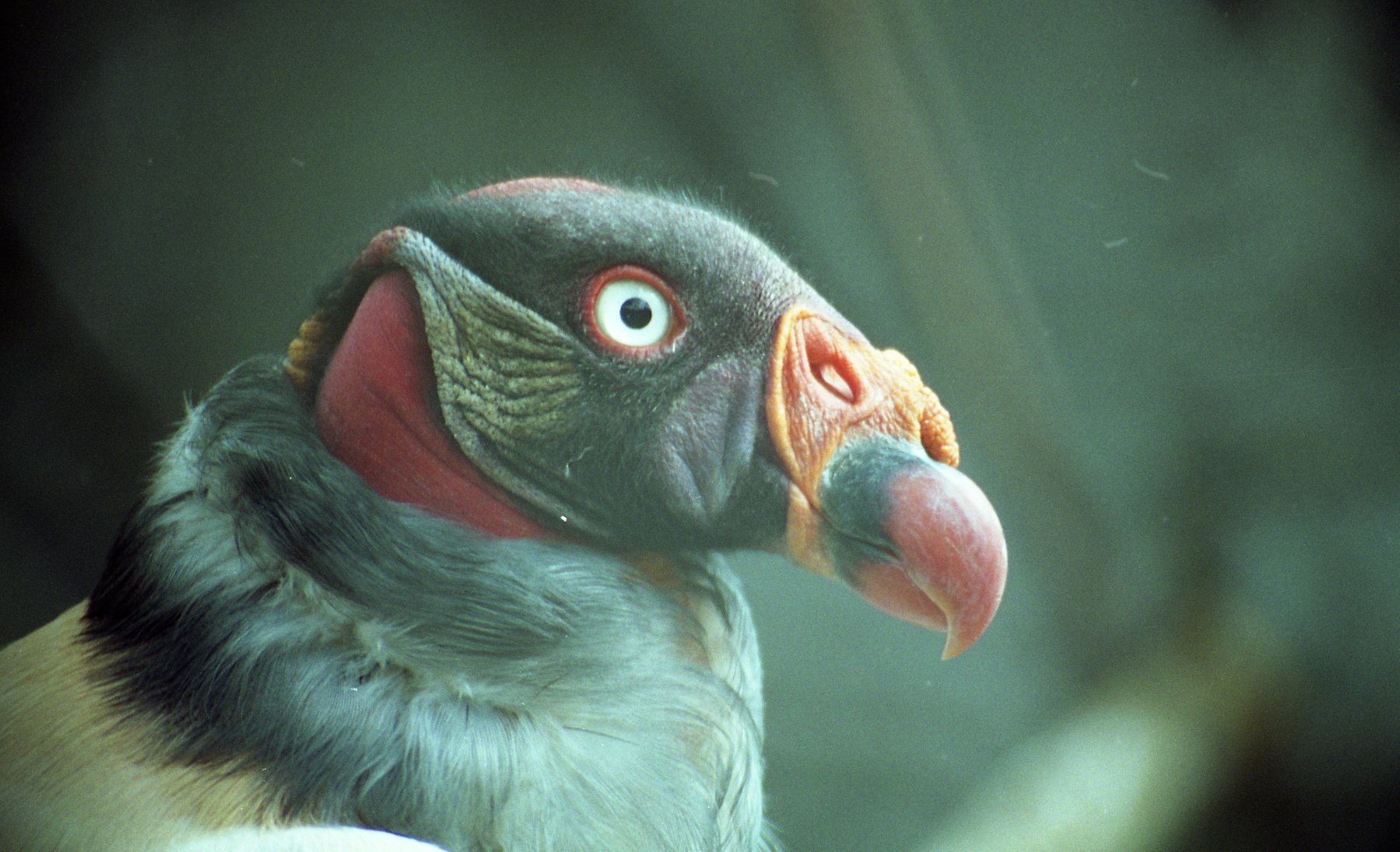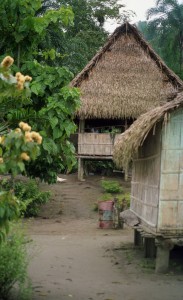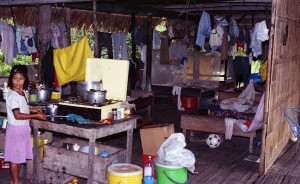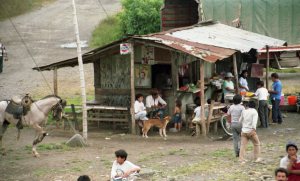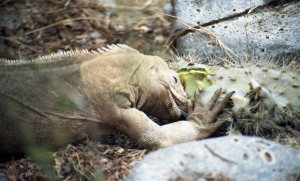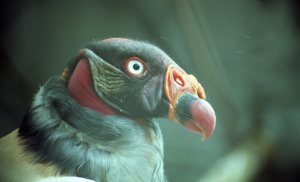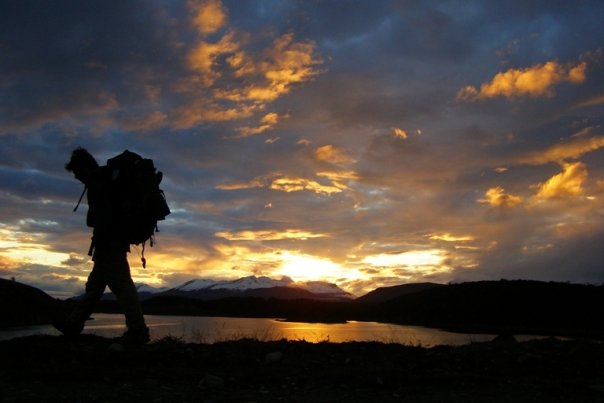Strangled by filth, and the escapades of drunken oil workers accompanied by their part-time prostitutes, the town of Coca, Ecuador, felt like a strange place to begin a jungle trek into the Amazon. The stench of raw sewage, trying to escape the unclean streams covered with wood planks, turned our breathing off. The arrival of two white-skinned women, one a blonde, blue-eyed thirteen year old, caused harmless (I hoped) stares. I slung my twenty five pound backpack over my shoulder to free a hand for pushing someone away, if necessary. The left hand reached for Katherine’s dangling hand needing reassurance, as any mother might do.
Katherine finally voiced her opinion with,
“This place looks as if nobody cares if anything ever happens.”
Did the Auca Hotel with its lovely gardens really exist in this unknown chaotic outpost in the midst of raw jungle? Did the word auca really mean savages in the Kichwa language? Adventure worked its way under our skin without either of us signaling it to begin.
On the journey back to the Auca we passed an IETEL office, the local phone company. Communication with the outside world? What a surprise! I considered the implications of calling my suburban home in the Midwest where husband and three children happily going about their everyday lives. What if Brennan, the ten year old, had broken his leg and wanted his mom back for some spoiling?
After the quick call, the sight of the last fresh fruit for ten days stopped us in our tracks. A truck slowed with offers to the Auca Hotel, and we jumped in the back. Greetings of fried eggs, rice and warm Cokes sounded delicious after seeing the clean sheets and screens on the windowed six-dollar-a-night room. Hammocks, books and sticky, but juicy, oranges occupied our dinner hour but still no sign of Luis Garcia, our guide.
Eggs scrambled (revoltos), warm rolls with jam, coffee and warm Coke helped us get through the morning hours of worrying whether we would find Luis. After experiencing twenty four hours of Coca, I hugged Luis with vigor when the knock came on the hotel door.
Wood crates filled with bottled water and food in the bow balanced the cook and boat driver at the back of the fifty foot canoe. After two hours on the Rio Napa River, the cook surprised us with hot pasta, lentils, peas, corn, potatoes, tuna, bread, oranges, Coke and Sprite served on the beach. This first jungle meal along with our new acquaintances eased our way into not knowing where our river journey may take us.
The weather decided to teach us some lessons about river travel in the rain. As the sun disappeared for the day, bodies chilled from the unexpected showers delighted with the covering of blue tarps unfolded to protect food supplies. By nightfall, my sense of security oscillated from the morning’s leftovers of total trust to how in the world could our boat race down the river in the dark of the Amazon? The motor stopped abruptly. The canoe bumped something, and we clenched fingers on wood seats to keep from falling sideways. Candles and voices appeared like ghosts. A fire line helped maneuver the wood crates, Katherine and me up the muddy hill.
The local Quechan Indians laughed as their own feet sank in what felt like quicksand. My feet glued to the muck until I managed to slip out of the rubber sandals. Up the embankment sat a welcoming site. Lit with candles, an open-sided thatched-roof hut offered safety from the rain and dark surrounding jungle. Tea, coffee and hot chocolate awaited our cold shivers after we somehow changed from wet soggy clothing into dry without bare skin showing; a trick that became easier with time. The Quecha chief talked of jungle medicines while Luis translated.
Mosquito nets about three feet tall covered straw mats wide enough for two spread upon harder-than-rock bamboo flooring. Bamboo floors made catching up on sleep something to dream about.
El Fonzo, the expedition cook, made complete meals appear like magic with his Boy Scout basics of knife, butane stove and boxes of food. Fried bananas coated in cream cheese, fried cornmeal pancakes folded over mounds of cheese, orange juice in boxes, warm bread, tea with honey, coffee, and hot chocolate all found their way beautifully presented on four foot long banana leaves for a tablecloth.
“In our house we have a machine that washes the dishes,” I explained to El Fonzo. He looked at me and requested innocently, “Could you bring the dishwashing machine to the jungle?”
Luis carried a fat journal with pages well worn and bent marking favorite thoughts and ideas. He explained his desire to become a medicine man like his father. I looked forward to Luis’s interrupting our walks with his explanations as the oppressive heat and humidity slowed me down. Luis gave us a brief glimpse into the mutually beneficial association of insects, animals and plants. I listened closely to his perspective of how traditions passed from generation to generation to guide the people in their relationship with the jungle, using plants for food and medicine. The Amazonian jungle offers humanity’s largest apothecary, and for hundreds of years, the locals have gained a better awareness of their environment.
“How do you protect yourself from diseases like malaria?” I questioned Luis.
“We trade for the bark of the rare Cinchona tree which grows at very high altitudes. We cook the bark and drink large amounts of the liquid,” he explained.
A local boy grabbed a vine and yelled, disturbing some blue Kingfisher birds pausing in a tree above. I could see a white ring around their necks above their red breasts.
Luis yelled, “Sacharuna, Sacharuna” and later explained the legend of Sacharuna, the ape man living in the jungle who killed people!”
Luis found some lemon ants under some over-turned bark. He suggested our tasting them would help us become “one with the jungle.”
“Crunchy but no flavor,” I told Katherine after squashing mine first before tasting.”
Luis said to Katherine,
“Don’t pee in the river because of the toothpick fish or Candiru. The fish is attracted to some chemical in urine, swims up the urine stream and with umbrella like barbed hooks, lodges itself in your privates! We all shuddered even after he explained this was an old Indian belief.
Jungle trekking calls for leaving some of those masks we wear for protection at home. Real feelings are hard to hide when a snake hisses while sitting on your boot or smiling with lemon ants stuck in teeth. Even when Julius said to not scream or sweat and the tarantula will not bite you, I realized that I didn’t have to hide my fears from anyone anymore except that tarantula.
I’m aware of the significance of this jungle after a few weeks of listening and feeling the bond these people have with their environment. I could not have imagined how this trip, the greatest science camp on earth, might have changed the course of Katherine’s life, now a practicing and successful environmental lawyer.
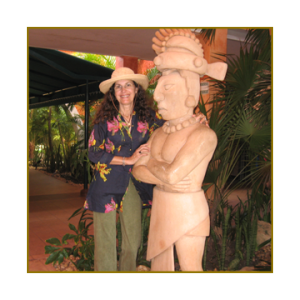 Jackie Chase travels the world meeting people from exotic cultures reaching for new challenges along the way. Even as a Midwestern housewife she felt compelled to share her adventurous nature with her four children. Jackie is more of a writer who travels versus a travel writer, sharing secrets from unique people whose lives help us all in the way we look at the world. Read more at http://culturesoftheworld.com/blog/
Jackie Chase travels the world meeting people from exotic cultures reaching for new challenges along the way. Even as a Midwestern housewife she felt compelled to share her adventurous nature with her four children. Jackie is more of a writer who travels versus a travel writer, sharing secrets from unique people whose lives help us all in the way we look at the world. Read more at http://culturesoftheworld.com/blog/
